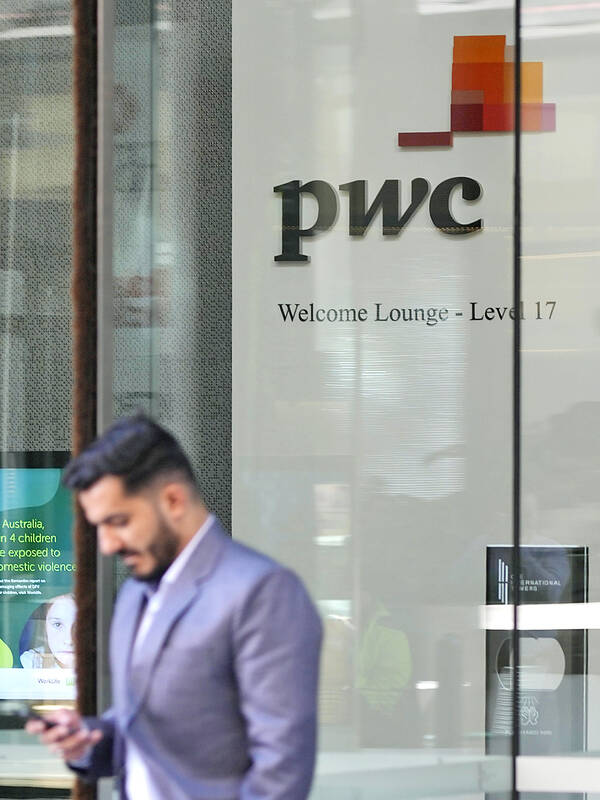PricewaterhouseCoopers (PwC) has identified a list of 76 current or former partners associated with its tax leaks scandal, handing over their names to Australian lawmakers.
“We’ve heard the calls from our stakeholders to release the names of those who were responsible for confidentiality breaches and we’ve been working as quickly as possible to determine that and to disclose these names to the senate per their request, and we have now done so,” PwC Australia acting chief executive officer Kristin Stubbins said in a statement yesterday.
In an e-mail to partners yesterday, first reported in the Australian Financial Review, Stubbins said former partners Michael Bersten, Peter Collins, Neil Fuller and Paul McNab were involved in breaching confidentiality.

Photo: AP
A spokesperson for PwC confirmed the names.
Stubbins added that the names of nine others who were placed on leave last week have been provided to a senate committee and promised to take appropriate action.
The firm also handed over a list of an additional 63 current or former partners and staff who received at least one e-mail containing confidential information, noting that those people might not have been aware of the confidentiality breach.
The Australian arm of the global consulting giant has been under pressure following revelations that a former senior partner obtained confidential tax policy information while advising the government and the firm then used it to advise global clients. The firm stands to lose millions of dollars in revenue because of the breach, as clients review their relationship with the consultant.
Last week, Australia’s largest pension fund said it was freezing all future contracts with the consulting firm in the wake of the scandal.
McNab said in a LinkedIn post that at all times he worked with clients to comply with Australian tax law, and not avoid it.
“For the record, I was not involved in any [Department of the] Treasury consultations regarding MAAL [Multinational Anti-Avoidance Law] where confidential information was discussed,” he said, referring to the multinational anti-avoidance law. “In addition, I trusted that the information shared with me as a partner of the firm would comply with any confidentiality agreements that may have been in place with Treasury.”

BYPASSING CHINA TARIFFS: In the first five months of this year, Foxconn sent US$4.4bn of iPhones to the US from India, compared with US$3.7bn in the whole of last year Nearly all the iPhones exported by Foxconn Technology Group (富士康科技集團) from India went to the US between March and last month, customs data showed, far above last year’s average of 50 percent and a clear sign of Apple Inc’s efforts to bypass high US tariffs imposed on China. The numbers, being reported by Reuters for the first time, show that Apple has realigned its India exports to almost exclusively serve the US market, when previously the devices were more widely distributed to nations including the Netherlands and the Czech Republic. During March to last month, Foxconn, known as Hon Hai Precision Industry

Taiwan Semiconductor Manufacturing Co (TSMC, 台積電) and the University of Tokyo (UTokyo) yesterday announced the launch of the TSMC-UTokyo Lab to promote advanced semiconductor research, education and talent development. The lab is TSMC’s first laboratory collaboration with a university outside Taiwan, the company said in a statement. The lab would leverage “the extensive knowledge, experience, and creativity” of both institutions, the company said. It is located in the Asano Section of UTokyo’s Hongo, Tokyo, campus and would be managed by UTokyo faculty, guided by directors from UTokyo and TSMC, the company said. TSMC began working with UTokyo in 2019, resulting in 21 research projects,

Ashton Hall’s morning routine involves dunking his head in iced Saratoga Spring Water. For the company that sells the bottled water — Hall’s brand of choice for drinking, brushing his teeth and submerging himself — that is fantastic news. “We’re so thankful to this incredible fitness influencer called Ashton Hall,” Saratoga owner Primo Brands Corp’s CEO Robbert Rietbroek said on an earnings call after Hall’s morning routine video went viral. “He really helped put our brand on the map.” Primo Brands, which was not affiliated with Hall when he made his video, is among the increasing number of companies benefiting from influencer

Quanta Computer Inc (廣達) chairman Barry Lam (林百里) yesterday expressed a downbeat view about the prospects of humanoid robots, given high manufacturing costs and a lack of target customers. Despite rising demand and high expectations for humanoid robots, high research-and-development costs and uncertain profitability remain major concerns, Lam told reporters following the company’s annual shareholders’ meeting in Taoyuan. “Since it seems a bit unworthy to use such high-cost robots to do household chores, I believe robots designed for specific purposes would be more valuable and present a better business opportunity,” Lam said Instead of investing in humanoid robots, Quanta has opted to invest